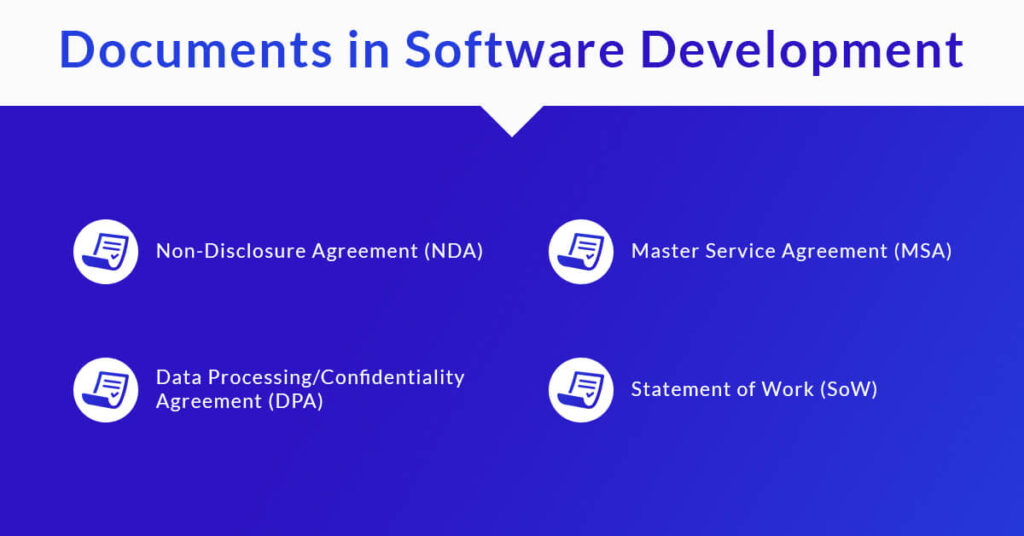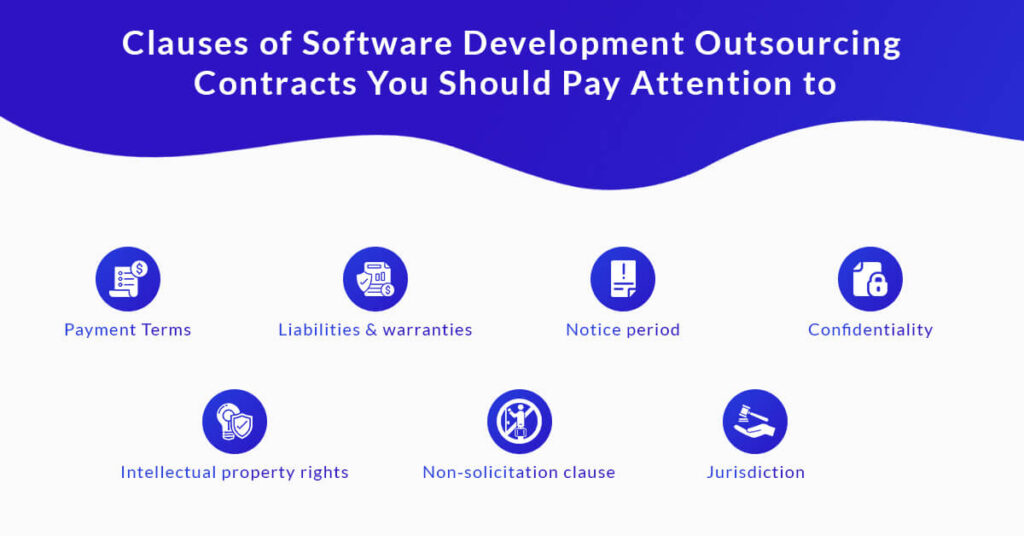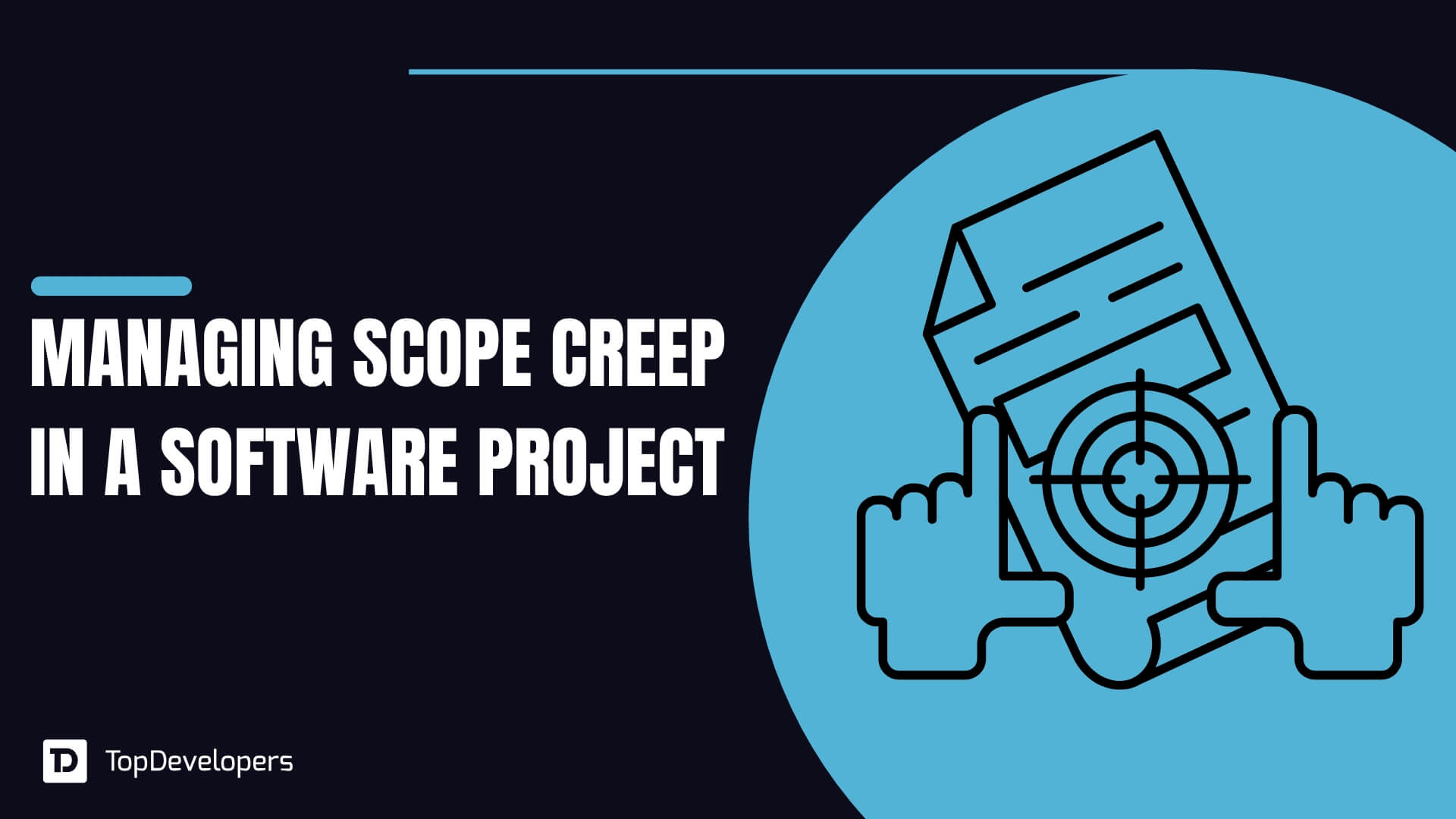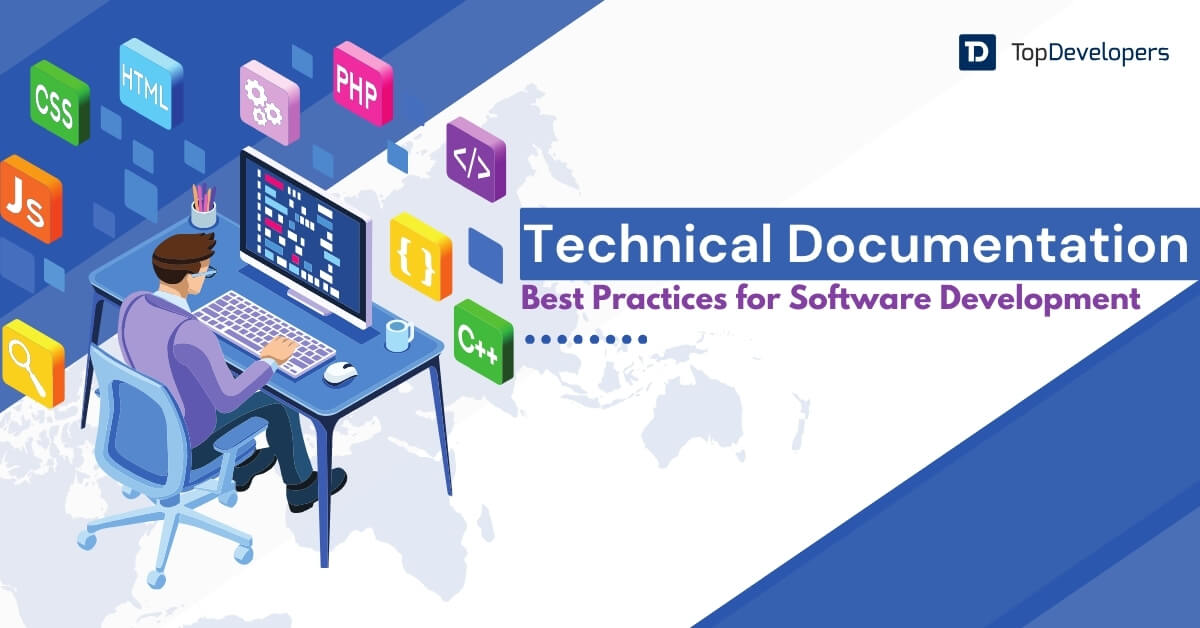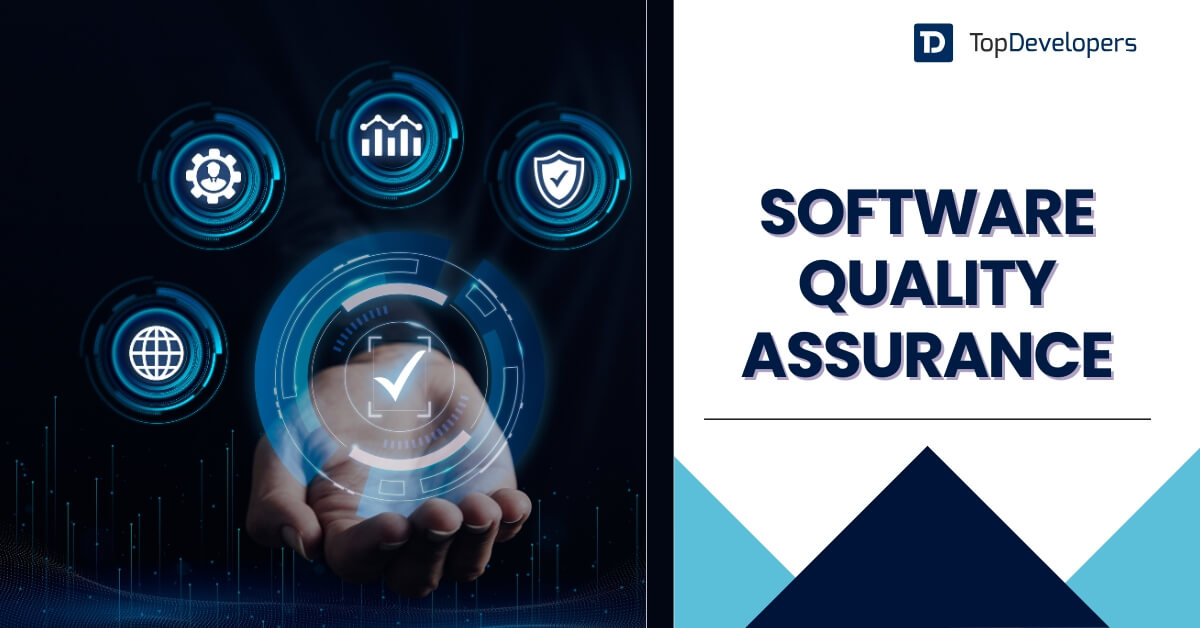
Outsourcing software development to an offshore software development company is fraught with several concerns that soon may turn into your nightmare if not paid serious attention. Not only do you need to be assured of falling into safe hands but also skillful.
From choosing the right technology partner to selecting the most suitable hiring model, and from checking on regular milestones to getting trustworthy after-sales support – all of this piles up into a complex process that requires solid documentation.
Table of Contents
The Need of documents in software development
If you wonder what measures you should take to assure that not even a bit of your software project is mishandled due to mismanagement, the formation of legal documents is the answer.
Documents in software development outsourcing shall set you worry-free so that you can focus on your business development and not trivial management quagmires. In fact, most professional software development companies would insist on having legal documents in place.
What are the Benefits of documents in outsourcing software development?
Software development documentation helps you streamline software development project outsourcing by all accounts. On the other hand, for a software development outsourcing company, documentation shall build their profile as a reputed and professional firm. Here are a few straightforward benefits of documents in software development outsourcing.
Surety
The first document sent to a software development outsourcing service providing company is the Request for Proposal/RFP with a set of features, specifications, and other important business objectives. Both, the software vendor (service provider) and the client perform reviews and carry out the scope with its feasibility. Negotiations and changes may happen as a part of project understanding before it finally kick-starts.
Assured budget limits
It is observed that many entrepreneurs, in the race of launching their products, often overlook documentation. As a result, the project’s scope and priorities go vague and feeble affecting the overall software development cost estimated. There are also fair chances of conflict on including features and scopes later which may ultimately affect the budget.
The surety on whereabouts
Documentation of software project outsourcing puts an end to your helplessness to trace or search the progress of the project in development procedure. With proper documents in place, you have an eye on the software development process and you know every milestone achieved or to be achieved.
Accelerated development
Delay in software development projects costs you an arm and a leg. That said, if the top software development outsourcing company kick-starts the project without any documents, it is likely to face several issues in streamlining the software development life cycle. Proper documentation speeds up the project and results in a quicker time to market.
Clarity
Outsourcing project involves risks when it goes undocumented. Clarity is key as it helps reduce the chances of misunderstanding, the major cause of project development failure. While fixing a contract with leading custom software development company, you are to deal with remote software developers with whom you are not in constant touch for clarification on business objectives and your business’ goals.
Documents for developers
Software developers aim to have a simple development plan with clearly defined milestones and timelines. Proper documentation also helps them keep a record of codes and methods used to build a software product; in addition, if the project is to undergo any knowledge shift or if you change software development team, clear documentation shall reduce the time the new talent acquisition takes to understand the progress so far.
Key Documents in Software Development
This guide to documents in software development outsourcing you absolutely should know is a comprehensive list of the required legal paperwork to help you have a fair business deal that is secure.
Non-Disclosure Agreement (NDA)
The non-disclosure agreement document tops the list of the required documents in the business deal of outsourcing software development. This document possesses all the necessary clauses that secure every bit of information about the software project. The exchange of information from both sides is classified as confidential and the software development firm is bound to keep it secured with no sharing with any third party whatsoever.
The agreement seals the deal securely and both parties sign the documents. It is also important for you to check out the list that defines and includes data or information as confidential for your project. Here is the list you can work upon for NDA–
- All digital procedures
- Software development processes
- Passwords
- Database (local and/or cloud)
- Source codes (make this sure)
- Strategies
- Architectures
- Any pilot projects
- Software Prototypes
Some enterprises, before outsourcing their software development projects to any remote development company, like to include a time frame till the information shall be kept confidential. Ideally, the period should be long enough that business should not get affected and stay secure from peers in the market. On the other hand, the period is kept short and practical so that the dedicated software development company shouldn’t feel trapped.
Opposite to NDA is the disclosure clause that many enterprises prefer to clarify before they kick off the project. While some classified information is crucial and kept secret, other information better goes public, which is beneficial for businesses. The parties that are likely to be considered for disclosure clauses include freelancers, employees, and business partners.
Master Service Agreement (MSA)
The Master Service Agreement (MSA) is a legal contract between a professional software development consultant and a client that defines clauses for project outlines, responsibilities, terms and conditions, and other crucial service agreements. The primary difference between NDA and MSA is the latter is more useful when the software development firm and the client are likely to work regularly in the future.
The MSA saves costs and hassles of negotiations between parties to facilitate a fair deal that works every time they seal the deal. Though documentation of MSA is highly complex, once drafted with consensus, it shall be used as a template/format for subsequent deals.
The document is beneficial to both parties the software development agency and client as they can avoid contractual clashes in the form of legal actions on the project’s goal, objectives, and even time frame. Such documentation, moreover, can fix the roles and responsibilities on both sides for any change in cost, time frame, or even technical requirements.
The legal teams at both parties define the provision of services with the acceptance of payments (including taxes, fees, time frames, and charges of all kinds). The teams then carefully define how long the document shall be valid.
Data Processing/Confidentiality Agreement (DPA)
As the name suggests, Data Processing Agreement (DPA) or Confidentiality Agreement addresses all the concerns of data processing performed by all the parties involved in the software development project. The DPA also regulates and defines the roles and responsibilities of both parties for data processing and controlling (confidentiality).
At times, in outsourced software development projects, data are shared with different parties and vendors in order to use it for building the software product or for customizing it. When such service providers or third parties are covered in DPA, strict norms are followed for data storing, processing, fetching, and even using.
Under the data processing agreement, any unwanted or unexpected event of data breaching would be considered a heinous act, and the responsible party would have to bear stringent legal consequences.
Statement of Work (SoW)
The Statement of Work -SoW, as the name suggests, is the complete statement of all the work that is predefined and in the scope. The document specifies deliverables of any kind for which the buyer has contacted the software development specialist or service provider; therefore, it is easier for both parties to keep track of the milestones and timeline. Industry experts look at this documentation as a moral responsibility and contractual obligation to fulfill the tasks.
Any change in the project for its scope shall require the responsible party to request a change in a formal way. Though SoW doesn’t possess stringent legal consequences but the documentation, in a way, introduces errands to the concerned company or entity. The dedicated software development teams then plan their workforce and task allocation to meet the business objectives stated by the buyers.
Here are some documents related to software development outsourcing:
- Source code document
- API Documentation
- Release notes
- Architecture design documentation
Clauses of Software Development Outsourcing Contracts You Should Pay Attention to
Outsourcing software development requirements can have great benefits to entrepreneurs but then the deal comes with a few cautions that may add bitterness to your relationship with the service provider. As a result, the entire software development project gets shadowed. Here we present to you, from our experience, the clauses of software development outsourcing contracts you should pay attention to.
Payment Terms
From negotiation to the way payment proceeds to the software development service provider, everything should be noted down and fixed before the project kick-starts. Both parties should mutually agree to the terms and conditions drafted in payment terms which may include the parts of payments to be released along with the deliverables, partially or completely.
Liabilities and warranties
Again, with mutual understanding, both parties agree to fix the liabilities (minimum to maximum) according to their roles and responsibilities. The liability cap is set to have control over financial exposure. On the other hand, a warranty aims at setting up a fixed time limit within which the software development solution provider is liable to build and deliver a predefined product or product.
Notice period
The notice period defines the timeline within which all the required changes or software solutions to escalations are defined. That said, notice periods assure the buyers to get things done within a timeframe.
Notice periods can be further classified into resizing the team wherein scaling the software development team (to increase or decrease the software development team members) is specified. Generally, such a notice period varies from one to three months. Furthermore, the second notice period includes the termination of the software development outsourcing contract between two parties which may vary from five months to one year, depending on the size and type of project or product.
Confidentiality
Protecting data has been of paramount importance to any enterprise. Hence, data protection should be one of the major concerns of buyers regarding what clauses are fixed between parties. Setting up the rules for data protection assures the buyers that their outsourced project is in safe hands. On the other hand, a security breach of any kind would give power to the buyers to sue and recover the damage from the service-providing companies.
Intellectual property rights
From owning the code to ids and passwords, the contract of software development outsourcing solution mentions the clauses of maintaining privacy and ownership for all the intellectual properties. While the buyer has an upper hand in this clause, the software development vendors too have the authority to act superior if the payment is not proceeded as per the other clauses.
Non-solicitation clause
Many projects require domain expertise and if the buyer or offshore software development service-providing company is keen to hire one, the non-solicitation clause comes into the picture. The collaboration with any other third party happens with strict clauses and norms agreed by both the concerned parties.
Jurisdiction
For any business deal to happen, the vicinity of jurisdiction is fixed before the project kick starts or the deal is finalized. Outsourcing software development services to an offshore company should have clear jurisdiction (location) so that any unwanted event should be addressed keeping the region’s laws in mind.
Overall, all the documents in software development outsourcing have their own importance and values; hence, while you contract any offshore company with a proper guide to hire the best software developers, make sure that you stay clear with the above-mentioned paperwork to protect your product.
 Avantika Shergil
| Jul 1, 2022
Avantika Shergil
| Jul 1, 2022
Avantika Shergil is a technology enthusiast and thought leader with deep expertise in software development and web technologies. With over 8 years of experience analyzing and evaluating cutting-edge digital solutions, Avantika has a knack for demystifying complex tech trends. Her insights into modern programming frameworks, system architecture, and web innovation have empowered businesses to make informed decisions in the ever-evolving tech landscape. Avantika is passionate about bridging the gap between technology and business strategy, helping businesses build customized software and website, and understand about different tools to leverage effectively for their ventures. Explore her work for a unique perspective on the future of digital innovation.
